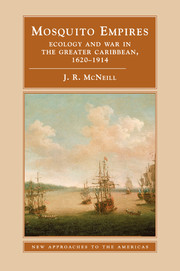Book contents
- Frontmatter
- Contents
- List of Maps
- List of Abbreviations Used in the Footnotes
- Preface
- Acknowledgments
- 1 The Argument (and Its Limits) in Brief
- PART I SETTING THE SCENE
- PART II IMPERIAL MOSQUITOES
- 4 Fevers Take Hold: From Recife to Kourou
- 5 Yellow Fever Rampant and British Ambition Repulsed, 1690–1780
- PART III REVOLUTIONARY MOSQUITOES
- Bibliography
- Index
4 - Fevers Take Hold: From Recife to Kourou
Published online by Cambridge University Press: 05 June 2012
- Frontmatter
- Contents
- List of Maps
- List of Abbreviations Used in the Footnotes
- Preface
- Acknowledgments
- 1 The Argument (and Its Limits) in Brief
- PART I SETTING THE SCENE
- PART II IMPERIAL MOSQUITOES
- 4 Fevers Take Hold: From Recife to Kourou
- 5 Yellow Fever Rampant and British Ambition Repulsed, 1690–1780
- PART III REVOLUTIONARY MOSQUITOES
- Bibliography
- Index
Summary
From Canada to Chile, the Americas in the seventeenth century served as a playing field for the ambitions of several European statesmen and countless independent warrior-entrepreneurs. The great prizes were land, labor and, above all, Spanish silver from Mexico and Peru. On the high seas, Spanish treasure fleets attracted relentless attention from pirates and privateers. On land, the most appealing targets were rich lands suitable for plantations and strategic points from which to dominate trade or undertake piracy. Early in the seventeenth century, some of these targets were poorly defended and thinly populated. Even modest forces might hope to take them.
As long as there was no yellow fever and little or no malaria, the prospects for success in assaults in the Greater Caribbean were highly encouraging. The small island of St. Kitts changed hands seven times between English and French in the years before 1665. St. Kitts had good soils and held promise as a plantation island, so it was worth the trouble to take. Without much in the way of fortifications or population, St. Kitts could scarcely hold out against a force of a couple of hundred determined armed men. Slaves formed a potential fifth column on almost every island, inspiring efforts at conquest and sometimes helping them succeed.
This chapter presents brief stories of two early episodes, the Dutch at Recife in Brazil, 1624–1654, and the English on Jamaica, 1655–1660, in which invading armies achieved significant conquests in the absence of yellow fever.
- Type
- Chapter
- Information
- Mosquito EmpiresEcology and War in the Greater Caribbean, 1620–1914, pp. 91 - 136Publisher: Cambridge University PressPrint publication year: 2010

